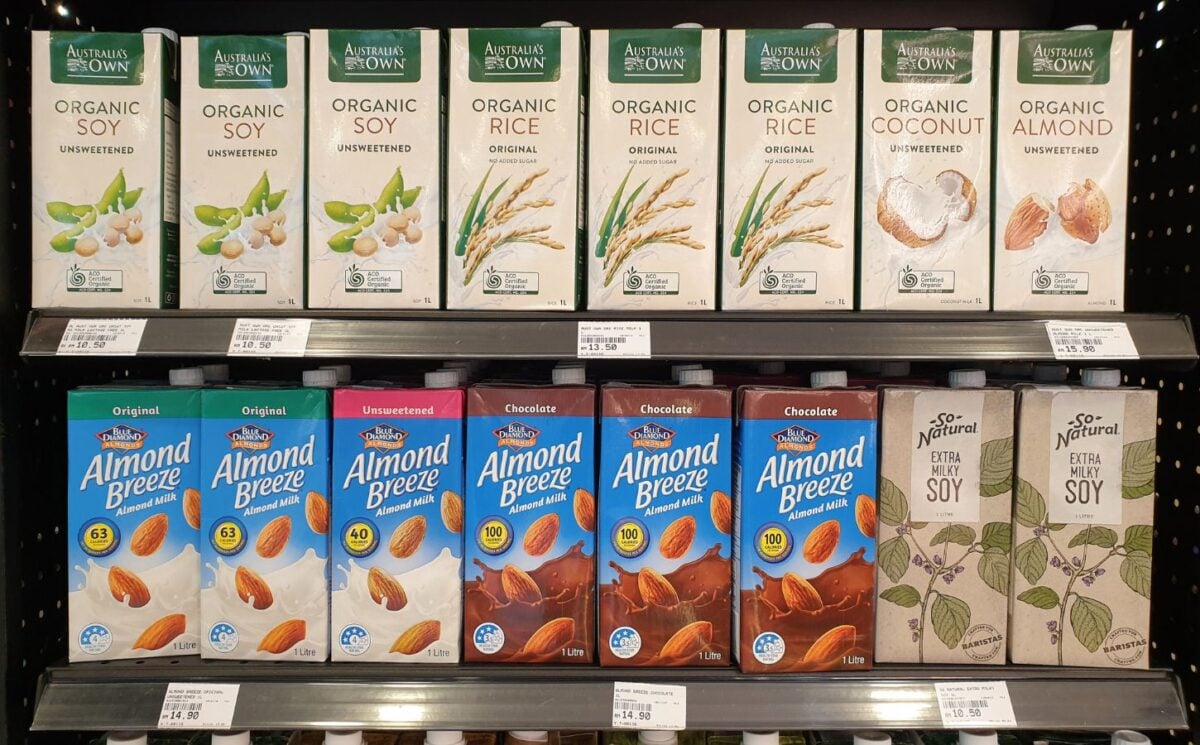A new study has caused a flurry of media reports that drinking plant-based milk raises the risk of depression. Several headlines name oat milk specifically as a risk to mental health, while others more broadly cite plant-based or vegan milk as the problem. Some claimed that the study showed vegans are more likely to be depressed because of the milk alternatives they drink.
The study, published in Frontiers in Nutrition, looked at the occurrence of depression and anxiety in more than 350,000 participants from the UK Biobank who drank different types of milk. The study had around a 13-year follow up period with participants, during which time 13,065 were diagnosed with depression and 13,339 with anxiety.
According to the results, drinking semi-skimmed milk was linked to a lower risk of anxiety and depression, while drinking “other types of milk” (i.e. not cow’s milk) was linked to an increased risk.
Read more: Is Oat Milk Bad For You? The Truth Behind The Claims
So, is it true that oat milk in particular – or plant-based milks generally – can make you depressed or anxious? Or that dairy-free milk puts vegans more at risk of depression? Let’s find out.
No link to veganism or oat milk specifically

Despite media headlines, the study does not specify what “other types” of milk participants drank. The only plant-based milk it mentions is soy, when it describes the list of options given to participants when asked what type of milk they drink. This list is described in the study as “including full cream, semi-skimmed, skimmed, soya (categorized as “other types of milk” in this study), other types of milk, never/rarely consume milk.”
This means that media headlines calling out oat milk specifically are arguably misleading. “The study also did not actually measure or investigate plant-based drink sub-groups (like oat, soy),” said oat milk brand Oatly in a statement when responding to the findings. “So the calling out specifically of oat drink is again misleading the general public.”
Read more: Plant-Based Meat And Milk Offer Similar Or Better Nutrition Than Animal Products, Study Finds
In addition, the study did not look at whether participants who didn’t drink cow’s milk were vegetarian, vegan, or omnivorous. “To conclude that a vegan diet increases the risk of anxiety and depression because the study found that “other” types of milk were associated with an increased risk, is an inaccurate and misleading conclusion,” Dr. Roxanne Becker, Medical Editor and Educator, told Plant Based News regarding some media interpretations of the study.
Plant-based diets and mental health
Some studies have found a link between meat-avoidance and depression. But the evidence for this being due to the nutritional deficiencies in vegan diets is unclear. One study showed that across omnivorous, vegetarian, and vegan diets, high-quality diets were linked to lower rates of depression. Another study found that meat-reducers were more depressed than either meat-eaters or or vegans. The author suggests that this aligns more with the hypothesis that meat-reducers experience more distressing cognitive dissonance, than with the nutritional hypothesis.
Soy, which vegans may consume in the form of milk, tofu, or other meat replacements like tempeh, has been found to have protective benefits for mental health. According to one study, people who eat soy products four to seven times a week are 48 percent less likely to experience depression.
“It is important not to misrepresent the findings of research, as this may scare people away from eating a plant-based diet, which not only may benefit mood, but also improve conditions like diabetes, high cholesterol, heart disease, and chronic inflammation,” said Dr. Becker.
Meanwhile, other studies cited in the new research on milk and depression have shown variable results in the links between dairy and mental health. One found that full fat milk was linked to higher rates of depression. Another found the same result, as well as no association between semi-skimmed milk and better or worse mental health.
In regards to physical health, dairy is linked to a number of conditions, including prostate cancer, heart disease, and type 2 diabetes.
In the conclusion of the latest study, the authors warned readers to interpret their findings “cautiously.” This is because “conclusions are based on self-reported dietary data and are influenced by the extensive duration of the follow-up.”
“To robustly establish these associations, further research is needed to validate these results and explore the impact of amount of milk consumed on mental health,” the authors concluded.
Read more: The Vegan Cheese ‘Health Warning’ – Is There Really Cause For Concern?






